Coronavirus: The war of our generation
Under Operation Balmis, more than 8,000 soldiers in Spain are doing what they can every day to support the fight against Covid-19, from building field hospitals and disinfecting senior residences, to transporting the bodies of victims
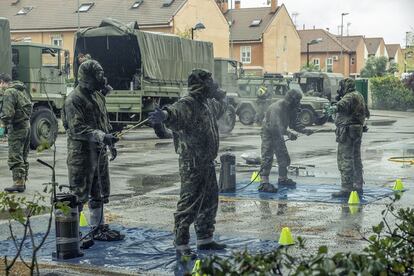
An icy rain falls on the city of Madrid. The streets are deserted. The scene is desolate. The capital is the epicenter of the coronavirus outbreak in Spain, with senior residences and care homes one of the major focal points of the pandemic. On the outskirts of the city, in a residential area of Alcalá de Henares, 48 paratroopers stand under a shower of rain that turns to snow and covers their black berets in white. An accumulative lack of sleep has caught up with them and there is not much in the way of chat. The courtyard of the senior care home has been turned into a parking lot for military vehicles. The paratrooper brigade has been there since dawn, and is ready to follow orders to disinfect the place.
At least three staff members at the center have already contracted the coronavirus, and a couple of very elderly residents are showing symptoms and are being isolated at one end of the building. Through a window, one of them looks to be in a terrible state, but no one knows for sure if they have the virus as they have not been tested.
We are here to help; it’s good for Spaniards to see what we are capable of and what we are doing with their taxesGeneral Rafael Colomer, head of the Guadarrama XII Brigade
The paratroopers’ decontamination mission is vital. The vast building, with 180 rooms and 200 residents, is believed to have a high viral load. Second Lieutenant Carlos Infante, a veteran nuclear, biological and chemical (NBC) defense specialist who is leading the operation, rolls his first cigarette of the day and addresses his unit. “We’re going to wait until the seniors have finished their breakfast, then confine them to the dining room on each floor, then we’ll go in,” he says. “It’s a big job, it’ll take 12 hours.” A drop of rain soaks his cigarette and he looks up at the sky.
At this early hour, other units from the large military bases on the outskirts of Madrid are on similar missions. So far, they’ve disinfected more than 2,000 residences. It’s a high-risk assignment and they know it. But they do it every day. “What happens if we’re afraid of catching the virus? We can’t be. What we are doing is the most fundamental act of solidarity. Otherwise, what are we good for?” says a young paratrooper.
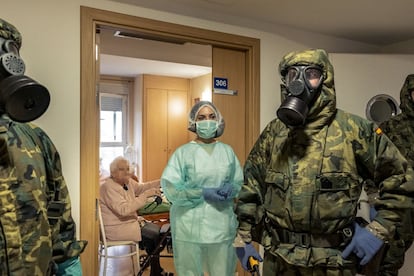
Convoys of vehicles filled with troops and decontamination material cross the ghostly capital, stopping at traffic lights. The Guadarrama XII Brigade, stationed at El Goloso military base where they keep Leopard battle tanks with cannons that have a 30-kilometer reach, is now on a mission to disinfect residences in Colmenar Viejo and Galapagar, north of Madrid. And the Military Emergency Unit (UME), the so-called “invention” of former Socialist Party (PSOE) prime minister José Luis Zapatero, which has been assisting in land, sea and air emergencies across Spain since 2005, is heading for the commuter towns of Alpedrete and San Sebastián de los Reyes.
The military units disinfect an average of 200 residences a day. The demand is relentless. In every corner of this devastated city, the military transports the sick and the dead in their hundreds. They build field hospitals and shelters for the homeless. They work at the field hospital in Spain’s Ifema convention center; they patrol the streets both alone and together with the Civil Guard and the National Police and try “to protect, offer security and instill confidence.” In other parts of the country, they are also protecting essential infrastructure, such as nuclear power plants, as well as manning Spain’s borders, flying in medical resources and helping Spaniards trapped abroad. They clean and patrol hospitals, airports, train and bus stations, and public buildings and they hand out water and food. They have even helped turn military vessels into floating hospitals. And since the epidemic began, nearly 300 members of the armed forces have contracted the virus.
They work without schedules. They eat when they can. They’re on the frontline. “We are here to help; it’s good for Spaniards to see what we are capable of and what we are doing with their taxes,” says General Rafael Colomer, head of the Guadarrama XII Brigade. “Supporting the civilian authorities is part of our annual training plan, and you know, you fight the way you train.”
Since the epidemic began, nearly 300 members of the armed forces have contracted the coronavirus
Colomer is currently monitoring the deployment of 1,300 soldiers and 300 vehicles from the Tactical Operations Center (TOC) of his headquarters, where the walls are covered with maps of Madrid. He is in constant contact with the Buenavista Palace, the headquarters of the General Army Barracks in Madrid’s central Plaza de Cibeles square, which assigns daily duties to army personnel across Spain. During the military coup d’état on February 23, 1981, the Guadarrama XII Brigade, which formed part of the famous “Brunete” 1st Armored Division, was ordered by Lieutenant General Jaime Milans del Bosch to occupy Madrid and destroy democracy.
Forty years later, on this gray morning, the same unit is in the city to help the public and carry out tasks not under the remit of other authorities, such as cleaning, building, transporting and patrolling. This time, their weapons are not just guns, but cloths and mops. Lieutenant Elvira Barbasán, who has not yet turned 30 and already commands around 100 gunners, is upbeat about the job at hand. “The best thing about all this is we’re standing by Spaniards in these tough times, interacting with them, being useful, which they clearly see and understand,” she says. “This is something that does not happen very often to us in the military and it is very gratifying. The citizens don’t know much about us. And it is a chance to offer some insight.”
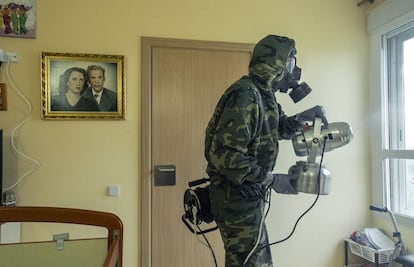
Her boss, General Colomer, explains that one of his units is in Barcelona disinfecting the region’s public buildings, from airports to police stations. Meanwhile, members of other units are working in the Basque Country and Valencia. “There hasn’t been a single problem,” he says, despite the fact Catalonia and the Basque Country are regions with strong nationalist movements that have been historically opposed to intervention from the central government. “The daily feedback is extraordinary. We go wherever we are wanted.”
Each of these military units working across Spain – 8,000 soldiers a day, including 3,000 military health professionals some of whom have come out of retirement – is signaled on the huge electronic map covering a wall at the Joint Operations Center (JOC) at the Retamares base, west of Madrid. Today 400 missions are underway. This is the nerve center of Operation Balmis – the Armed Forces mission to combat the coronavirus crisis. The JOC looks like a cinema with the lights dimmed. At the front of the room are screens showing data that is continuously updated. Close by, officers from the three different armed forces are on computers. They are experts in operations, logistics and intelligence. At the top of the amphitheater, three generals and a naval captain receive all the information they need to make decisions. There are also members of the Civil Guard, the National Police, Civil Protection and the Military Emergency Unit, as well as liaison officers who are in contact with Spain’s Health, Defense, Interior and Mobility ministries, all of which are managing the crisis.
Operation Balmis is named after Francisco Javier de Balmis, a military doctor who organized an around-the-world expedition to distribute the smallpox vaccine in the early 19th century
“This is pure coordination,” explains a naval officer. “We are like mailboxes; we have information about what is needed everywhere in Spain at any given time and we know which military unit can do it because of their proximity and competence. And we cross reference this data. Every unit knows 24 hours in advance what it has to do the next day.”
Currently, 12-hour shifts are the order of the day here, but the JOC is active 365 days of the year. Spain’s air, sea and land space is also controlled from this room, as well as its military operations abroad, in which 3,000 Spanish soldiers are currently participating – some of whom have also been infected. A handful of electronic clocks mark the time zone of every place that Spanish military personnel have been deployed, whether they are in transit or in Lebanon or Iraq.
At 8am, the “operations update” takes place in this room with mathematical precision, during which the shift supervisor who is about to go off duty explains the current state of play to the officer relieving him and to the lieutenant general, Fernando López del Pozo, who is in charge of executing Operation Balmis. A specialist in emergencies, López del Pozo struggles to arrange his mask, which he is careful to keep over his nose. All the JOC officers wear one, as well as latex gloves. And they maintain a safe distance from one another. A lieutenant colonel continually warns the journalist not to go near him. “Neither of us can get sick,” he says.
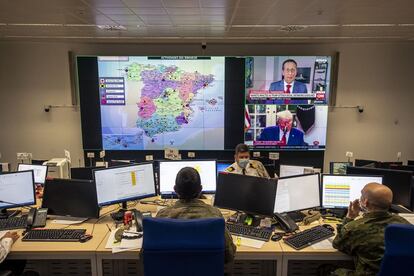
The JOC was activated by Defense Minister Margarita Robles on March 13, when the royal decree implementing a state of alarm, aimed at slowing the coronavirus outbreak, was published. “Early on Saturday, March 14, we had a meeting of the Planning Group to set the whole operation up,” explains Colonel Juan Bustamante. “That meeting produced an operations plan – a brief dossier that considered the needs of the ministries of Health, Defense, Interior and Mobility, and how we could support them. At the end of the meeting, a naval captain suggested naming the operation ‘Balmis’ – the name of a military doctor [Francisco Javier de Balmis] who organized an around-the-world expedition to distribute the smallpox vaccine in the early 19th century. It fit. This is a military mission to support the civilian population. Pure crisis management. In just 48 hours – by Monday, March 16 – we were on the streets, with Madrid as a priority, and the soldiers patrolling the subway and train stations.”
This is a military mission to support the civilian population. Pure crisis managementColonel Juan Bustamante
But it wasn’t entirely unknown territory. “We pay a lot of attention to detail,” explains one officer from the Operations Command. “The military has a strategy for everything.” This command center, from which a war involving Spain would be directed, has the advantage of having a permanent structure with which to conduct operations as well as the technical support from around 20 contingency plans, drawn up by 100 full-time analysts, which are updated every year. These plans contemplate a variety of potential risks to state security, from high-intensity conflicts to terrorist threats and natural disasters. And when any of those contingencies arise, the corresponding sealed envelope is opened and the response activated. Pandemics and epidemics were included in the 2017 National Security Strategy under the Mariano Rajoy administration. Lieutenant General López del Pozo explains that the situation was being considered in the light of the 2014 Ebola epidemic. That epidemic caused only one death in Spain, but 12,000 in Africa, and it continues to hang like the sword of Damocles over humanity – though not in the same way as the coronavirus. “This [the coronavirus crisis] is exceptional. But we are responding to it every day and helping the most disadvantaged groups,” says López del Pozo.
“Come on, Maria, finish your milk and your muffin,” says a nurse to an 80-year-old eating breakfast in her room at the Alcalá de Henares residence where the paratroopers are waiting to disinfect. “The police are going to come and help us.” The senior care facility is a home of smaller homes, with each room holding the treasured memories of the resident as well as their most prized possessions. There are old black and white photos, framed fans, children’s drawings and religious prints. On the sink stands the perfume gifted by the grandchildren at Christmas. One of the rooms looks like a small palace with silver candlesticks and a red velvet armchair, and another looks like the cell of a Carthusian monastery. The resident of this one doesn’t want to go out in the hall. He needs convincing. The care workers at the residence have lifted the mattresses, opened the wardrobes and bathrooms and removed the curtains and carpets. The residents are confined to the dining room on each floor and sit there with their masks on, on separated chairs. All look confused and some look panic-stricken. Most are sad. After a while, they appear to become lost in their own thoughts. One woman, who has been watching the decontamination process through the glass, suddenly claps her hands and cries, “Long live Spain!”
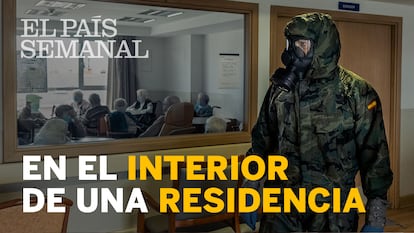
Second lieutenant Carlos Infante puts out his cigarette and moves his unit into action. They are provided with freshly opened NBC equipment – camouflage uniforms made of a technical and leathery fabric that hermetically covers their face, head and body, and fastens at the wrists and ankles with duct tape. They wear thick rubber gloves and rubber shoes that make them walk like ducks. Over their faces are black M6-87 masks with carbon filters that protect against bacteriological, chemical and radioactive contamination. They can drink without removing this from a flask that looks like an anteater’s snout. When they put the mask on, it fogs up and their breathing becomes labored. Any physical effort is four times as hard. The effect is similar to a feeling of drowning.
Communicating with gestures alone, the paratroopers climb the stairs to all four floors of the residence. The NBC operational procedure means disinfecting from the top floor down, without going near the “hot spot” where the sick have been isolated. Before entering the building, the soldiers themselves have been thoroughly disinfected to ensure that no germs enter or leave the residence. Whenever they take a break, they have to repeat this process, which entails being sprayed with cold water and bleach – sodium hypochlorite – washing shoes, gloves and finally hands and face. The mask comes off and for a few minutes they can breathe easily. Then they go back inside. “Here, even if you go out to pee, you have to disinfect yourself again,” one soldier jokes.
We have been given this mission and I treat it as if it were a high-intensity conflict, like a war against the virusSolider disinfecting senior residence in Madrid
Decontaminating the residence is a slow and systematic business. Soldiers spray bleach on the ceilings and walls. Then another team of paratroopers arrives, spraying ten-liter bags filled with bleach into every nook and cranny, dousing the beds, wardrobes and bathrooms. Then comes the “Commando Wipe” team that cleans each doorknob, mirror, door, table and handrail with a cloth. Finally, there is the mop brigade that deals with the floors. Room by room, corridor by corridor, bathroom by bathroom. When it’s all done, the residence is dried and ventilated. “We have been given this mission and I treat it as if it were a high-intensity conflict, like a war against the virus,” says one exhausted soldier.
The armed forces’ work under Operation Balmis is fast, flexible and modular. And it is going on everywhere in Spain. On the one hand, the military are offering the civilian authorities tangible support and on the other, they are shoring up confidence and helping the public feel more secure. When French President Emmanuel Macron launched a similar military mission against the coronavirus called Resilience, French president, he made it clear that it was quite different from Operation Sentinelle, which is designed to combat Islamist terrorism within the country. “Resilience will be focused on supporting citizens and public services in a continuous dialogue with the state authorities,” he said.
And that is the key – being at the service of the authorities; making the population feel safe. When Lieutenant Ezequiel’s unit patrols the deserted streets of El Escorial some 50 kilometers northwest of Madrid, and the footsteps of around 30 soldiers from the Guadarrama brigade reverberate across the cobblestones of the monastery, their role is clear. They don’t carry rifles and only the officers are armed. From the windows the residents smile down at them. Captain Diego Ruiz responds with a salute and the residents break into applause.
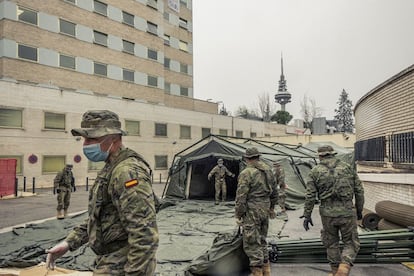
What is the point of these patrols? According to the royal decree officially declaring the state of alarm, these soldiers are “agents of authority.” “This does not mean that they can make arrests or file complaints, because they are not judicial police,” explains López del Pozo. Consequently, some patrols have joined forces with members of the National Police and the Civil Guard, which is a way of using 120,000 Spanish soldiers to help with public security, under the orders of the state security forces and the Interior Ministry. “The prime minister [Pedro Sánchez] has looked in the state’s toolbox and has seen that the military is ideal in a moment of national crisis when the security and well-being of citizens is threatened because we can do everything – we reach everywhere, we are disciplined, we have a capillary structure, logistical means and we are not afraid. We have a complete catalogue of abilities and are very clear on how far we can go,” explains a senior military official.
Captain Francisco José González has just set up a field hospital with 130 beds in Segovia, northwest of Madrid, with the Salamanca Engineer Command, which is specialized in setting up military camps. He is now setting up another field hospital in Madrid, outside the Gregorio Marañón hospital, which has been overwhelmed by coronavirus patients. Next, the unit will be in the Catalan city of Sabadell to set up an emergency hospital in the city’s sport center. The interior of the enormous Drash tents, set up in just minutes outside the Gregorio Marañón hospital, is bright, comfortable, clean and even warm. They are a perfect backup for the hospital’s emergency department, but not as a permanent ward for coronavirus victims. Two generators installed by Captain González’s soldiers provide the field hospital’s power – there is air conditioning and toilets. A brief chat with these military engineers reveals that they are young and highly motivated people. “We are happy to lend a hand wherever we are needed,” says one.
On the other side of Madrid, a non-commissioned army officer has been entrusted with a more taxing job – that of transporting corpses to the temporary morgue that has been set up in Madrid’s Ice Palace skating rink. Without missing a beat, he explains the task: first strict triple identification protocol of the bodies, then the sealing of the body bags with a zipper, followed by the sealing of the coffins. “The key is not to break the chain of care at any time; to get rid of any doubts. This is the job we have been called on to do. Yesterday we moved almost 100 [bodies]. It’s another way of serving Spain, one we could never have imagined. This is the war of our generation.”
English version by Heather Galloway.
